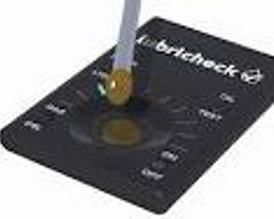
Measuring oil viscosity levels?
This post is mainly to record
the date when we changed the oil in the generator.
The book says to change it
every 8 hours of operation or 6 months, whichever comes first.

I'm planning on adding
synthetic oil, which should last longer than conventional oil and give
the engine more protection. One way to know for sure when the oil needs
to be replaced is to measure the viscosity with a new device I saw in Farm
Show magazine called Lubricheck. I'm not sure how well it works,
but it might pay for itself in a few years at only 40 dollars.
Want more in-depth information? Browse through our books.
Or explore more posts by date or by subject.
About us: Anna Hess and Mark Hamilton spent over a decade living self-sufficiently in the mountains of Virginia before moving north to start over from scratch in the foothills of Ohio. They've experimented with permaculture, no-till gardening, trailersteading, home-based microbusinesses and much more, writing about their adventures in both blogs and books.
Want to be notified when new comments are posted on this page? Click on the RSS button after you add a comment to subscribe to the comment feed, or simply check the box beside "email replies to me" while writing your comment.

I don't think your generator clocks up enough hours per year to be worried about the oil quality on account of running time. Aging and acidification of the oil is probably more of an issue, I'd say.
The oil filter should take care of metal particles and soot. Change or clean it regularly. Usually when you change the oil, but look in the generator manual. To catch bigger metal particles, lots of engines come with a magnet in the oil pan or drain plug. If so, that should be cleanded as well.
You can test the Ph of the oil with e.g. litmus paper or universal indicator. The oil should be a base. If it turns acidic, it's definitely time to change it. These indicators are very cheap.
In general synthetic oil withstands aging better than regular oil.
Test strips for Ph are around $0.10 each. That price is hard to beat. But if you really want to, you can make your own.
Given that the generator won't contain a huge amount of oil, keeping it in good shape by running it regularly and changing the oil and filter every year (give it a general look-over; check the spark-plug &c) seems like a good precaution. Trying to save a couple of dollars by skimping on maintenance of emergency equipment does not sound like a good idea to me.
Don't waste the money on synthetic oil.
As Roland suggests, oil rarely "breaks down" to stop lubricating. Oil acidifies as it ages. The acid adversely affects the metal. With use, oil accummulates soot, which serves to "sandblast" internal parts as it circulates,so change it frequantly, according to usage.
I'm sold on a product called V-Max, which is a mineral oil based additive. Most wear on engines occurrs with that first cold crank on unlubricatred surfaces at start up. This product penetrates deeper into metal surfaces than plain oil, so is in place for that first crank.
FAA rules say aeronautical engines using V=Max must be rebuilt every 10,000 hrs, as opposed to the 5000 hr interval demanded for standard oil.
V-Max also runs the engine cooler and with better lubrication: I get 50 mpg on my Harley, as opposed to the 42mpg I got before adding this.
I'd be careful with oil additives. The days that engine oil was a simple refinery product are long gone.
Most engine oils already contain ZDDP (a prime ingredient of oil additives) which function as an anti-wear additive , corrosion inhibitor and antioxidant. And adding more doesn't make it better.
Another popular additive is PTFE ("teflon"). Interestingly, the people who invented it don't think it useful in engine oil. Additionally, unlike the ZDDP, it is a solid that does not dissolve in oil. So it tends to settle in places where there isn't a lot of oil movement; i.e those parts of the engine where additives aren't needed.
Lubricants are big business. If a small manufacturer found an extremely good additive, you can bet that one of the large lubricant manufacturers would either speedily acquire them or copy the product if they thought they could get away with it...
Natural oils are not of a constant quality. It takes work (mixing, tuning additives) to make them into a constant quality motor oil. Synthetic oil doesn't have that variation.
Mark: look at the manual of your generator, see if there are any recommendations w.r.t. oil.